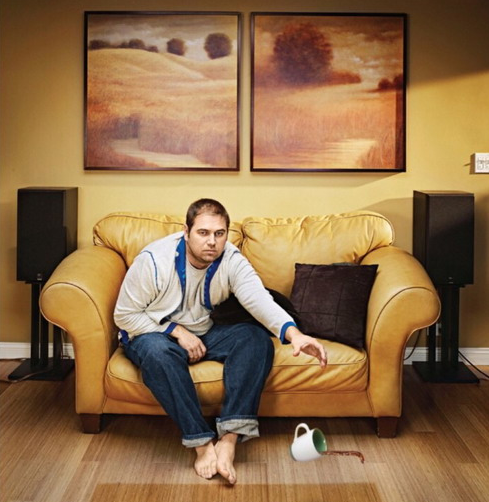Dialogue 1
Jingjing: Hey! Quit biting your nails! That's a bad habit!
京晶:嘿,別啃你的手指甲啦,這是個壞習慣。
Xiao Gao: It's a bad habit, I've done it since I was a kid.
小高:我知道這是個壞習慣,但是我從小就這么干了。
Jingjing: Sounds like you got OCD, do you do it a lot?
京晶:聽起來你有強迫癥啊?你經常會這樣嗎?
Xiao Gao: Yeah, pretty often. Do you ever tweak out about things like that?
小高:是,挺經常的,你有沒有一些類似的事情讓你焦慮的?
Jingjing: Sometimes when I'm about to put my earbuds in to listen to music, I always have to make sure that the R and L are in the correct ear.
京晶:有時當我要帶塞入式耳機聽音樂的時候,我總是得確定左邊和右邊沒帶反。
Xiao Gao: Ohh, you know what else drives me nuts? After I set the alarm at night to wake me up in the morning, I gotta check again like 5 minutes later to make sure I actually set it.
小高:哦,你知道還有事什么讓我抓狂嗎?當我在睡覺前設定好第二天早上的鬧鐘之后,五分鐘后我肯定要再次確認一下我到底有沒有上好。
Jingjing: Yeah, sometimes I have to make sure over and over that I locked the door at night before I sleep.
京晶:是,有時在睡覺之前,我要反復確認門有沒有鎖好。
Xiao Gao: I can't stand it when someone doesn't completely clean the blackboard in school. I'll feel really weird in class and keep looking at.
小高:我還不能忍受學校的黑板沒有被完全擦干凈,這樣的話上課的時候我會覺得很奇怪,并且要一直盯著黑板看。
Jingjing: I remember when I was going to school and our test grades would be out for us to look at, I would never go and see my score.
京晶:我記得我在上學的時候,學校會把考試成績公布出來。我從不會過去看我的分數。
Xiao Gao: Sounds like we're both a little OCD. Hey, what does OCD stand for anyway?
小高:聽起來我們都有一點兒強迫癥,到底強迫癥代表什么呀?
Jingjing: You tell me! Why don't you go home and do some research about it?
京晶:這得等你告訴我呀,不如你回家查查吧。
Xiao Gao: Geez, is being bossy one of your OCD habits too?
小高:天哪,難道發號施令也是你的強迫癥癥狀之一嗎?
習語短語
1. OCD = 強迫癥
2. tweak out = (口語)為某事焦急,著急
3. earbuds = 塞入式耳機
4. (something) drives me nuts = 某事讓我抓狂
5. like = (口語) 這里指大概;例如:
I'll be there in like 5minutes.我大概5分鐘后到。
6. can't stand (something) = 不能忍受某事
7. score = 成績
8. bossy = (形容詞)喜歡發號施令的,愛命令人的

Dialogue 2
Jingjing: So? What did you find out about OCD?
京晶:你查到什么有關強迫癥的信息啦?
Xiao Gao: Well, it stands for Obsessive Compulsive Disorder. Basically it's when you have a lot of anxiety and you do a lot of repetitive behaviors to make the anxiety go away.
小高:嗯,強迫癥的全稱是強迫性神經官能癥。大致就是說你有很多的焦慮,并且必須通過重復某種行為才讓這種焦慮消失。
Jingjing: What kinds of behaviors are you talking about? Did you find out about anything new?
京晶:你指的是什么樣的行為?你還找到什么新的信息了嗎?
Xiao Gao: Yeah I did. Do you know what hoarders are?
小高:嗯,你知道什么是囤積控嗎?
Jingjing: I think so.Aren't they the people who have to round up a bunch of sheep?
京晶:知道呀,不就是那些養了很多羊的人嗎?
Xiao Gao: No, those are called herders, I'm talking about hoarders! H-O-A-R-D-E-R-S. Hoarders! Hoarding is when you keep a lot of things and don't throw them away, even if they are worthless or meaningless.
小高:不, 那些是牧羊人herders,我說的是囤積控hoarders, H-O-A-R-D-E-R-S。囤積控就是,盡管有些東西已經沒有用處了,你還是要保留著不把它們扔掉。
Jingjing: I don't know,Xiao Gao… Your room is pretty messy. Do you think you might —
京晶:哎呀,小高,我覺得你的房間就挺雜亂的呢,你說你會不會是……
Xiao Gao: Hey! My room is messy but it's not that bad!
小高:嘿,我的房間是有點兒亂,但是也沒有那么糟糕啊。
Jingjing: Anyways, do a lot of people suffer from this disorder?
京晶:哈哈,很多人都有強迫癥嗎?
Xiao Gao: It's fairly common. Actually, it's the fourth-most diagnosed mental disorder. One in fifty people have been diagnosed with it in the United States.
小高:嗯,這病還挺常見的,確切地說,這種病的發病率在心理疾病里排名第四,在美國,每50個人里就有一個人被確診為有強迫癥。
Jingjing: Uh oh! We're doomed! We probably have it too!
京晶:哦,不會吧,我們死定了!我們很可能也有這種病!
Xiao Gao: Don't worry! I think we're okay. I also learned that just because you might have some obsessive behaviors, doesn't mean that you have OCD.
小高:別擔心,我覺得我們沒問題,而且我還了解到,就算你有一些強迫性的行為,也不一定說明你就是強迫癥。
Jingjing: Is it treatable?
京晶:這個病能治嗎?
Xiao Gao: Yes. The good news is that this mental disorder is treatable with therapy and medication!
小高:是的,好消息就是這種心理疾病可以用藥物和特殊療法治愈。
Jingjing: Thanks for the info.
京晶:謝謝你告訴我這么多。
Xiao Gao: My pleasure.
小高:不客氣。
習語短語
1. hoarder = 囤積控,指那些執意保留一些沒有用的物件兒,而不把它們們扔掉的人
2. round up (something) = 收集,聚集
3. fairly = 相當地;例如:
I was fairly sure that she was innocent.
我相當肯定她是無辜的。
4. We're doomed. 我們玩兒完了。
5. The good news is… = 好消息就是……(通常用于說了一個壞消息之后)











